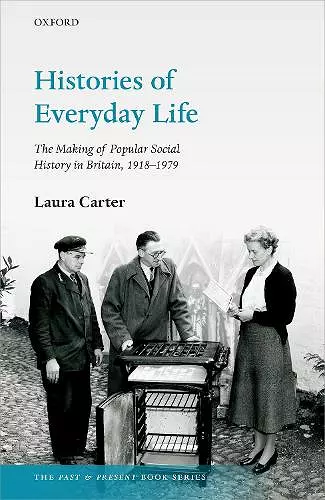Histories of Everyday Life
The Making of Popular Social History in Britain, 1918-1979
Format:Hardback
Publisher:Oxford University Press
Published:22nd Jul '21
Should be back in stock very soon

A detailed examination of popular history in Britain from 1918 to the 1970s, highlighting the role of education and societal change. Histories of Everyday Life offers key insights.
This book offers a comprehensive exploration of the evolution of popular history in Britain from the end of the First World War to the 1970s. It delves into how ordinary citizens were educated about history through various mediums, including books, schools, museums, and BBC radio broadcasts. The narrative highlights the emergence of a new form of social history, often spearheaded by non-academic historians, particularly women, who sought to make history accessible and relevant to the masses.
Histories of Everyday Life examines the concept of 'history of everyday life,' which arose as a response to the educational needs of a burgeoning mass democracy following 1918. This pedagogical approach was designed to engage and inform everyday people, making history a part of their daily lives. The book traces the development of this movement, illustrating how it was popularized in educational settings and through various media, effectively bringing history to the forefront of public consciousness.
As the narrative unfolds, it argues that the decline of the 'history of everyday life' in the 1970s was not due to the rise of a new academic social history but rather a result of societal changes that rendered this popular approach less viable. Ultimately, Histories of Everyday Life reflects on the significant impact of mass education on British culture in the twentieth century, positioning this era as a pivotal moment in the nation’s educational journey.
It is a fascinating and convincing analysis based on meticulous research-evidenced by the large bibliography and extensive footnoting. It is likely to remain a key text for those whose interests lie in education, museums, local history, local government and even for those of us who recall with nostalgia some of their own experiences. * Tim Lomas, Family & Community History *
In Histories of Everyday Life, Laura Carter offers a fresh and compelling take on the origins and popularization of social history in Britain in the decades after the First World War. * Jon Lawrence, Twentieth Century British History *
The book will interest not just the education specialist, but really anyone who is keen to review the much explored ground of 20th British society from an original, new vantage point. * Clémence Fourton, Revue Française de Civilisation Britannique *
For compelling reasons that Carter carefully unplaits and then rebraids, ordinary children and their ordinary parents were offered resources like books, radio broadcasts, museum exhibits, and school curricula that focused on the way people like them had lived in earlier centuries. Using a fresh approach to both materials and methodologies, she teases out scarce evidence to demonstrate that exposure to these resources profoundly affected people's experience and consciousness. * Leslie Howsam, Journal of British Studies *
Carter's text offers a valuable lens through which to consider educational and social change in twentieth century Britain; she demonstrates the importance of understanding these processes of change in conjunction with each other. Her work contributes to a growing reconsideration of the British education system as being shaped by factors beyond political actions and by people beyond political actors, an approach that nuances our understanding of both British educational history and British social history. * Florence Smith, HISTORY: Reviews of New Books *
Employing an illuminating periodisation and a distinctive, deftly gendered, notion of conservative modernity, Carter has drawn upon a wide range of sources and used 22 illustrations, an index and data on the interviewees to connect publishing, pedagogic, municipal and curatorial developments and provide a multi layered analysis of shifts in British culture. * Daniel Weinbren, Family & Community History *
This meticulously researched monograph interweaves oral histories with a wealth of primary materials, including cigarette cards, children's essays, and photographs. Its contents will interest a wide range of historians, and its challenge to conventional narratives of social history will prove as stimulating to established scholars as to undergraduates exploring the subject for the first time. * Max Long, Cultural and Social History *
For historians of a certain generation, E. P. Thompson's The Making of the English Working Class created a new social history that illuminated the neglected lives of ordinary people. * D. L. LeMahieu, American Historical Review *
In less than 300 pages, Carter leads the reader masterfully through the many settings in which the history of everyday life unfolded in the first decades of the 20th century * Thomas J. Sojka, Los Angeles Review of Books *
Employing an illuminating periodisation and a distinctive, deftly gendered, notion of conservative modernity, Carter has drawn upon a wide range of sources and used 22 illustrations, an index and data on the interviewees to connect publishing, pedagogic, municipal and curatorial developments and provide a multi-layered analysis of shifts in British culture. * Daniel Weinbren, Family & Community History *
Revealing and fascinating about many facets of twentieth century British culture. * Pat Thane, Cercles *
This meticulously researched monograph interweaves oral histories with a wealth of primary materials, including cigarette cards, children's essays, and photographs. Its contents will interest a wide range of historians, and its challenge to conventional narratives of social history will prove as stimulating to established scholars as to undergraduates exploring the subject for the first time. * Max Long, Culture and Social History *
- Winner of Shortlisted, RHS Whitfield Book Prize, Royal Historical Society.
ISBN: 9780198868330
Dimensions: 242mm x 160mm x 22mm
Weight: 580g
288 pages